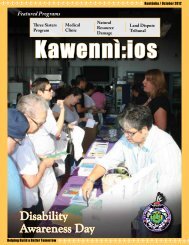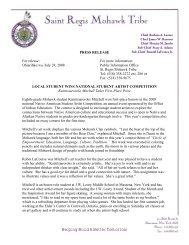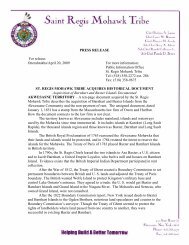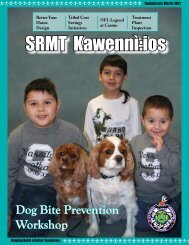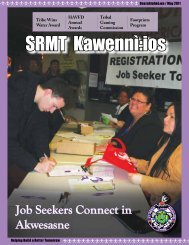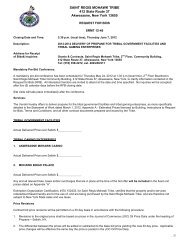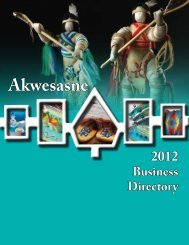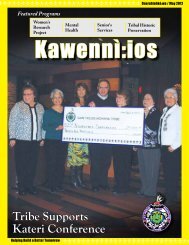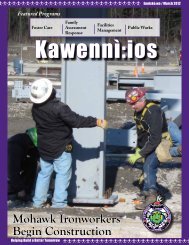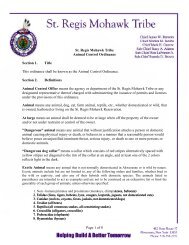SRMT Tribal Procedures Act - Saint Regis Mohawk Tribe
SRMT Tribal Procedures Act - Saint Regis Mohawk Tribe
SRMT Tribal Procedures Act - Saint Regis Mohawk Tribe
Create successful ePaper yourself
Turn your PDF publications into a flip-book with our unique Google optimized e-Paper software.
SAINT REGIS MOHAWK TRIBETRIBAL PROCEDURES ACT<strong>Tribal</strong> Council <strong>Procedures</strong> <strong>Act</strong> of 1994 AmendedFinal Draft Revision: April, 2013SECTION I.TITLE – TRIBAL PROCEDURES ACTThis Ordinance shall pertain to the government of the <strong>Saint</strong> <strong>Regis</strong> <strong>Mohawk</strong> <strong>Tribe</strong> (hereafterreferred to as “<strong>Tribe</strong>”) and shall be known as the <strong>Saint</strong> <strong>Regis</strong> <strong>Mohawk</strong> “<strong>Tribal</strong> <strong>Procedures</strong> <strong>Act</strong>”.SECTION II.PURPOSEThis Ordinance will replace the “<strong>Act</strong> relating to <strong>Tribal</strong> Council Powers, <strong>Procedures</strong>, InitiativeReferendum, Recall and Removal from Office” commonly referred to as the 1994 <strong>Procedures</strong><strong>Act</strong>. This Ordinance significantly revises the 1994 <strong>Procedures</strong> <strong>Act</strong> by giving enrolled <strong>Tribal</strong>Members (hereafter referred to as Members) a greater voice in <strong>Tribal</strong> Government and makingthe <strong>Tribal</strong> Government more transparent and accountable to Members. The Ordinance allowsmore Member participation in the <strong>Tribal</strong> Government, makes it much less burdensome forMembers to initiate petitions to enact laws, reject laws and place questions before themembership in a referendum process. The Ordinance also makes the <strong>Tribal</strong> Council’s (hereafterreferred to as Council) actions more transparent and open by requiring the Council to conduct itsbusiness through regular meetings open to the membership. In addition, the Ordinanceestablishes rules or conduct and procedures for <strong>Tribal</strong> Monthly Meetings, provides for a processallowing Members to review <strong>Tribal</strong> budgets and also allows Members access to public <strong>Tribal</strong>records.1
SECTION III.DEFINITIONS1. “Eligible Voters” shall have the same meaning as the term is defined in the“<strong>Tribe</strong>’s Election and Referendum Ordinance,” as amended.2. “Member” means a person who is duly enrolled as a member of the <strong>Tribe</strong>.3. “Serious Crime” shall have the same meaning as the term is defined in the <strong>Tribal</strong>Ethics Ordinance, as amended, which states, “a felony or misdemeanor notinvolving an act of civil disobedience but that which involves an act of moralturpitude. Crimes of moral turpitude are crimes involving dishonesty such aslarceny, fraud and murder.”4. “Staggered Term” shall mean the system approved by tribal referendum in April2004 whereby elections are held each year in June to fill two (2) of the six (6)elected officer positions – one Chief and one Sub-Chief.5. “<strong>Tribal</strong> Clerk” is an elected position for a term of three (3) years.6. “<strong>Tribal</strong> Laws, <strong>Act</strong>s and Ordinances” are forms of legislation intended to reflectthe policies aimed at protecting the health, safety, well-being and sovereignty ofthe <strong>Tribal</strong> government and of tribal members. They are also intended to provide alawful basis for the regulation and governance of the territory under thejurisdiction of the <strong>Saint</strong> <strong>Regis</strong> <strong>Mohawk</strong> <strong>Tribe</strong>.7. “Sovereign Authority of the <strong>Tribe</strong>” is the governmental authority to take any andall actions necessary to promote the health, safety, education and general welfareof the <strong>Saint</strong> <strong>Regis</strong> <strong>Mohawk</strong> <strong>Tribe</strong> and its members.8. “<strong>Tribal</strong> Council Resolutions” are the recorded decisions of <strong>Tribal</strong> Council onmatters requiring a formal expression of such decisions. Some examples include,but are not limited to, adoption and amendment of <strong>Tribal</strong> Ordinances or laws thatdo not require Referendum vote, approval of grant applications, appointment ofAdministrators of estates and conduct of day-to-day <strong>Tribal</strong> business operationsrequiring a written record of <strong>Tribal</strong> Council approval.2
SECTION IV.COUNCILA. Composition1. The Council shall consist of three (3) Chiefs, three (3) Sub-Chiefs and one (1)<strong>Tribal</strong> Clerk elected by Members.2. Each year one (1) Chief and one (1) Sub-Chief will be elected to the Council on astaggered term basis.B. Term of Office and Eligibility1. Chiefs and Sub-Chiefs will be elected to three (3) year terms of office.2. <strong>Tribal</strong> Clerk will be elected to a three (3) year term of office.3. Eligibility to run for Council shall be determined by the <strong>Tribal</strong> ElectionOrdinance, as amended from time to time.C. Powers and Duties of the CouncilThe three (3) Chiefs shall exercise all legislative and executive powers of the <strong>Tribe</strong> including,but not limited to the following; subject to the restrictions set forth in Section V: (Removal) andSection VI: (Referendum Powers):1. To promote and protect the health, safety, education and general welfare of the<strong>Tribe</strong>.2. To enact ordinances and adopt resolutions as the <strong>Tribe</strong>, and to enforce the same.3. To negotiate with <strong>Tribe</strong>s, Federal, State and other national Governments.4. To charter subordinate organizations, including housing, financial, economicdevelopment, health and other community boards and commissions, and todelegate to such organizations or to any subordinate boards or official of theorganizations the power to manage the economic affairs and enterprises of the<strong>Tribe</strong>, reserving the right to review any action taken by virtue of such delegatedpower.5. To establish a <strong>Tribal</strong> Education System exclusively for the benefit of its membersand residents.6. To employ legal counsel and fix compensation and fees.7. To regulate its own procedures for the management of Council business throughthe adoption of ordinances and resolutions.3
8. To regulate the use and disposition of all land within the jurisdiction of the <strong>Tribe</strong>,including but not limited to, the enactment of ordinances providing for the mannerof making, holding and revoking assignments of tribal lands or interest therein.9. To enact ordinances providing for the removal or exclusion of any non-memberswho may remain within the jurisdiction of the <strong>Tribe</strong>.10. To provide by ordinance for the establishment and regulation of organizations orentities including public and private corporations and for any lawful purposewhich may be profit or non-profit making.11. To borrow money and issue bonds and other evidences of indebtedness for thepublic purposes of the <strong>Tribe</strong>.12. To negotiate and contract with the Federal, State, Local and other governments,and with the Council and governing authorities of other Indian <strong>Tribe</strong>s or Indianorganizations, and private organizations, corporations and other entities.13. To levy and collect fees general and special assessments from any members orother person, firm or entity residing on or engaged in revenue generating activityon the land of the <strong>Tribe</strong> in order to raise revenue for the needs of the <strong>Tribe</strong>.14. To request the Secretary of Interior to confer trust or reservation status on landsreserved for, granted to or purchased by the <strong>Tribe</strong>.15. To advise the <strong>Tribe</strong> and members on all appropriation estimates and Federal andState projects for the benefit of the <strong>Tribe</strong>.16. To provide by ordinance for the jurisdiction of the <strong>Tribe</strong> over Indian ChildWelfare matters and all other domestic relations matters.17. To administer the tribal government and conduct inquiries and hearing on theactivities and performance of the administrative operations of the <strong>Tribal</strong>government.18. To apply for or accept grants, cooperative agreements, and donations from anyperson, firm, corporation, foundation, foreign country, organization, state, local,government, or the United States of America and any subdivision or componentthereof.19. To take any action that may be necessary to defend the rights of <strong>Tribal</strong> membersand the rights and powers of the <strong>Tribe</strong>.4
20. To take any action that may be necessary to carry out the initiatives of the <strong>Tribe</strong>.21. To take any action that may be necessary to carry out the sovereign authority ofthe <strong>Tribe</strong>.D. Powers and Duties of the Sub-Chiefs1. The Sub-Chief shall have all the power and shall perform all the duties of theChief with whom s/he is elected for the remainder of the Chief’s term of office,in the case of such Chiefs’ inability to act due to the following:a) Chief dies during term of office.b) Chief deemed mentally incompetent by a licensed physician, withauthentication by the <strong>Tribal</strong> Clerk.c) Chief is removed, (see Section V).d) Chief resigns.2. The Chief may give authority to his or her Sub Chief to act upon his or herabsence, or temporary inability to act, in writing, such writing to be delivered tothe <strong>Tribal</strong> Clerk and shall indicate the duration and extent of authority designated.3. The duties of the Sub-Chief are determined by their respective Chief.E. Powers and Authority of the <strong>Tribal</strong> Court1. As defined in the <strong>Tribe</strong>’s Judiciary <strong>Act</strong>, as amended from time to time.F. Powers and Authority of the <strong>Tribal</strong> Clerk1. As defined in the <strong>Tribal</strong> Clerk <strong>Act</strong>, as amended from time to time.SECTION V.REMOVALA. Recall of <strong>Tribal</strong> Council1. Members of the <strong>Tribe</strong> shall have the right to recall a Council member by filing apetition signed with a minimum of ten percent (10%) of eligible voters with theElection Board.a) The Recall Election shall be held when a petition containing 10% ofeligible voters required above is verified by the <strong>Tribal</strong> Clerk.b) The Member must register the petition with the <strong>Tribal</strong> Clerk, who shalldetermine the number of signatures required, as of the date upon5
egistration of the petition. Such number to be valid for a period of one(1) year from the date of registration.c) Recall elections shall be managed according to the <strong>Tribal</strong> Election andReferendum Ordinance.d) To Recall a Council Member, a majority of those voting must vote infavor of his/her Recall.2. Council members may also be recalled pursuant to the provisions of the “<strong>Tribal</strong>Ethics Ordinance”, as amended from time to time.SECTION VI.REFERENDUMSA. Authority of Members to Initiate ReferendumsMembers shall have power to initiate referendums subject to the provisions setforth in this Section and in any regulations that are issued pursuant to thisOrdinance (“Initiative”).1. A referendum may be called to adopt new laws, reject or amend existing laws, orto pose questions on issues that affect the community.2. In order for a referendum to be placed on the ballot for a vote, the Member mustobtain the valid signatures of five percent (5%) of eligible voters.3. The Member must register the petition with the <strong>Tribal</strong> Clerk, who shall determinethe number of signatures required, as of the date upon registration of the petition.Such number to be valid for a period of one (1) year from the date of registration.4. In order for the referendum to be validly approved it must pass by a majority ofvotes cast.5. The Election Board shall conduct a <strong>Tribal</strong> Referendum within ninety (90) days ofreceipt of a valid petition.B. Authority of the Council to Initiate Referendums1. The Council may place any proposed or existing law or question to themembership for a referendum vote by a majority vote of the Chiefs.2. The Council must place the following issues to the membership through thereferendum process:6
a) Fundamental changes to the membership qualifications of the <strong>Tribe</strong>;b) Fundamental changes to the rights of membership of the <strong>Tribe</strong>;c) Fundamental changes in the residency rules and requirements of the <strong>Tribe</strong>;d) Fundamental changes in the voting requirements of the <strong>Tribe</strong>;e) Fundamental changes in the basic government structure of the <strong>Tribe</strong>; andf) Non-budgeted, non-emergency expenditures by the <strong>Tribe</strong>, of <strong>Tribal</strong>General Funds, that are in excess of $2,500,001.00.C. Rules and Regulations Governing Referendum Elections or Initiative Referendums1. The <strong>Tribal</strong> Election Board shall be responsible for administrating the <strong>Tribal</strong>Election and Referendum Ordinance.SECTION VII.MONTHLY TRIBAL MEETINGSA. General Provisions1. The Council shall schedule regular meetings on the first Saturday of each monthto conduct business and meet with Members. In rare instances, the Council shallhave the ability to change the meeting date, but only upon adequate public notice.a) The May <strong>Tribal</strong> meeting will be held on the second Saturday.b) The June <strong>Tribal</strong> meeting will be held on the second Saturday.2. The meetings shall be held at the <strong>Tribal</strong> Community Building or such place asshall be established by the Council upon giving advanced notice to thecommunity.3. The meetings shall be chaired by one of the Chiefs.4. The meetings shall be open to all Members.5. If a Member wants to have an item on the Agenda s/he must call the Council’soffice no later than close of business on the Monday before the scheduledmeeting.6. The Chief who is chairing the meeting shall decide upon the final agenda for themeeting.7
B. Rules of Procedure for MeetingsThe Chair shall preside over the Meeting and shall use the rules contained in the current editionof Robert's Rules of Order Newly Revised to govern the assembly in all cases to which they areapplicable and in which they are not inconsistent with this <strong>Tribal</strong> <strong>Procedures</strong> <strong>Act</strong> and any specialrules of order, practice and/or custom of the <strong>Saint</strong> <strong>Regis</strong> <strong>Mohawk</strong> <strong>Tribe</strong>, existing or that may beadopted.1. Meetings will begin promptly at 10:00 a.m. and will adjourn no later than 1:00p.m.2. The <strong>Tribal</strong> Clerk shall take a count to determine if a quorum (twenty-five (25)enrolled members and 2 of 3 Chiefs) is present, the chair shall then call themeeting to order. The count shall include elected officials.3. If there is no quorum by 10:15 a.m., there is no meeting.4. If a quorum is present, the Chair shall call the meeting to order.C. Rules of Personal Conduct for Meetings1. Conduct should be respectful in the Meetings.2. Members should not interrupt while another is speaking.3. Comments should be constructive and directed to the topic that is being discussed.4. There shall be a time limit of five (5) minutes for any one member to discuss anissue.5. There will be no discussions of a personal nature.6. There will be no discussions related to personnel issues.7. Photographs and videos of the meetings are not permitted unless prior approvalfrom the assembly is obtained.8
8. Violation of any of the above rules may result in a tribal member being removedfrom the meeting; or any other action being taken by the Chair of the meeting,including suspension of the meeting.D. Motions from the Floor1. With the exception of personal and/or personnel matters, Members may makemotions at a Monthly meeting to request the Council to take any action that iswithin the Council’s authority provided that there is a quorum present and themotion is seconded by a Member.2. The motion must be presented in a form that clearly states the action beingrequested of Council.3. The motion will pass upon a majority vote of Members, at the meeting.4. If the motion passes, the Council will place that issue on its Agenda for the nextscheduled Work Session and report back to the Community at the next MonthlyMeeting on what, if any action was taken.5. In response to such motions, it is the responsibility of Council to consider eachmotion and make an independent decision whether acting upon the motion is inthe best interests of the <strong>Saint</strong> <strong>Regis</strong> <strong>Mohawk</strong> <strong>Tribe</strong>, as a whole, and, if so, to takeofficial action upon the motion.6. In the event that the Council determines not to take action upon a motion from thefloor, the Member has the option of utilizing the Petition/Initiative process torequire a referendum on the matter.E. Meeting MinutesThe purpose is to have an accurate record of what is discussed.1. The <strong>Tribal</strong> Monthly Meeting shall be electronically recorded by the Office of the<strong>Tribal</strong> Clerk.2. Should a Member wish to listen to the recording, the <strong>Tribal</strong> Clerk shall set forth atime and location for the recording to be available for review.9
3. The minutes of the <strong>Tribal</strong> Monthly Meeting shall consist of a summary of theactions taken, or requested to be taken, as well as a summary of <strong>Tribal</strong> CouncilResolutions passed by <strong>Tribal</strong> Council for the month immediately prior.SECTION VIII.WORK SESSIONS1. The Council shall designate a period of time to hold Work Session to act uponresolutions, ordinances and conduct other official business of the <strong>Tribe</strong>. Thesemeetings will be held at least two times a month (bi-monthly) or more frequentlyat the Council’s discretion when the need arises and such meetings shall berecorded by the <strong>Tribal</strong> Clerk’s Office.2. The Work Session shall be held in the <strong>Tribal</strong> Council Boardroom or any otherlocation <strong>Tribal</strong> Council deems appropriate, and is open to all Members, except forexecutive session.3. The Council may take official action on pressing matters outside of WorkSession; however, any such actions taken must be presented at the next WorkSession and must be recorded.SECTION IX.TRIBAL COUNCIL RESOLUTIONS1. All decisions of the Council on matters where a formal expression of approval isneeded shall be written in a Resolution.2. A Resolution may be proposed by any member of the Council, any <strong>Tribal</strong>member, or any <strong>Tribal</strong> program or department.3. A resolution shall be submitted as outlined by TCR 2011-50, as amended fromtime to time, and presented to Council for action in a Work Session and shall beadopted when at least two out of three Chiefs vote to accept it.10
4. <strong>Tribal</strong> Council Resolutions enacting Laws, <strong>Act</strong>s or Ordinances shall meet theadditional requirements set forth below.SECTION X.TRIBAL LAWS, ACTS AND ORDINANCESAs summarized below, the procedure for enactment of <strong>Tribal</strong> Ordinances is as follows:1. Formal enactment of <strong>Tribal</strong> Laws, <strong>Act</strong>s or Ordinances (together “Ordinances”)shall be evidenced by the adoption of a <strong>Tribal</strong> Council Resolution.2. An Ordinance may be proposed by the Council, any <strong>Tribal</strong> Member or anyDepartment or Program of the <strong>Tribe</strong>. (A member may also propose an ordinancevia the referendum process, refer herein to Section VI A).3. The proposed ordinance and the review process, including provisions for reviewand comments by Members, is set forth in the following procedure:a) Initial review by the Council shall be conducted within thirty (30) days.b) The <strong>Tribal</strong> Clerk shall issue a notice to the <strong>Tribal</strong> Membership that suchlegislation is being presented for comment. The date of this notice shallcommence the thirty (30) day comment period. Comments may bepresented at public meetings, or in writing to the <strong>Tribal</strong> Clerk’s Office.c) Following the draft comment period, <strong>Tribal</strong> Council shall have at leastthirty (30) calendar days to consider the comments received and create afinal draft of the proposed legislation and shall provide responses to thecomments made in the form of a response summary.d) Once a final draft is complete, it shall be submitted to the <strong>Tribal</strong> Clerk,who shall issue a notice to <strong>Tribal</strong> Membership that such legislation isbeing presented for final action.11
e) Upon the conclusion of the final thirty (30) day notice period, <strong>Tribal</strong>Council may take action to enact the Ordinance when at least two of threeChiefs vote to adopt the proposed legislation.4. In the event that <strong>Tribal</strong> Council elects to put the pending Ordinance to areferendum vote or adoption of the Ordinance requires a referendum votepursuant to Section VI, B. 2, or the Ordinance has been put forward through theReferendum process, the Referendum Election process shall be followed.5. If the Referendum results in a vote to accept the Pending Ordinance:a) The Election Board will ensure the Appeal Process of the ReferendumElection process, is adhered to.b) The Election Board will certify the Referendum Election Vote and presentthe certified vote to Council.c) The Pending Ordinance is enacted and <strong>Tribal</strong> Council shall take all stepsnecessary to implement the Ordinance.6. If the Referendum results in a vote to not accept the Pending Ordinance:a) The Election Board will conduct the Appeal Process of the ReferendumElection process.b) The Election Board will certify the Referendum Election Vote and presentthe certified vote to Council.c) The process is terminated and the Pending Ordinance and a copy of thecertified vote is presented to the drafters of the Pending Ordinance.SECTION XI.OPEN RECORDS1. Open Records: The following categories of information are “open” and availableto <strong>Tribal</strong> members:12
a) The names and titles of employees of the <strong>Tribe</strong>;b) Job postings;c) Census data regarding population (not membership);d) Salary, bonuses and benefits received by elected or appointed officials ofthe <strong>Tribe</strong>:e) Human resource policy manuals;f) <strong>Tribal</strong> Court opinions or court decisions (subject to redaction ofconfidential or minor information);g) <strong>Tribal</strong> ordinances, policies and resolutions and amendments thereto;h) Publicly filed organizing documents of any <strong>Saint</strong> <strong>Regis</strong> <strong>Mohawk</strong> <strong>Tribal</strong>entity (i.e. charters);i) Annual financial audits, all financial disclosures that have been deemedopen to <strong>Tribal</strong> Members;j) Minutes of <strong>Tribal</strong> Council open meetings, as per TCR 2011-55;k) List of eligible voters (can only be viewed in the clerk’s office fromCaucus to election and only for purposes of verifying voter eligibility);l) Statistical data of <strong>Tribal</strong> members (numbers only); andm) Election candidate lists, voting results.2. Public Records: The following information is deemed “Public” and is available tothe general public.a) Laws and Policiesb) Company and/or business namesc) Newslettersd) Policies and procedures such as personnel policy and court procedures.e) Sex offender registryf) Media Releases and publications3. Exceptions and Limitations<strong>Tribal</strong> government business often includes matters relating to <strong>Tribal</strong> businessenterprises. The purpose of these exceptions is to address the non-disclosure ofcertain business records, records of a sensitive nature, or situations where the13
<strong>Tribal</strong> members’ right to access is outweighed by the <strong>Tribe</strong>’s interest in keepingsuch records confidential.The following shall be exempt from disclosure and inspection shall not begranted:a) Proposals and bids for any contract or agreement, including informationwhich if it were disclosed would frustrate procurement or give anadvantage to any person proposing to enter into a contract or agreementwith the <strong>Tribe</strong>, until an award or final selection is made and after deletionof the portions which are exempt from disclosure under this law.Information prepared by or for the body in preparation of a bid solicitationshall be exempt until an award or final selection is made;b) Contracts or other agreements which specifically prohibit disclosure of thecontent of the contract or agreement to third parties;c) Any and all records related to: contracts containing a confidentiality ornondisclosure provision; any proposed contracts or employment relatedcontracts;d) Any personally identifiable information including medical, financial,personnel records or similar files or information, including but not limitedto <strong>Tribal</strong> enrollment numbers, social security numbers.e) Privileged attorney-client information or attorney work product and allrelated records.f) Records of law enforcement agencies, prosecution, or regulatory agenciesthat deal with detection and investigation of crimes.g) Matters specifically exempted from disclosure by applicable federal, state,or tribal statute or law.h) Any records containing proprietary information, trade secrets orinformation that would be deemed privileged in litigation;i) Drafts, notes, recommendations, memoranda and other records in whichopinions are expressed, or policies or actions are formulated;14
j) Inter-office communications relating to proposals or matters which havenot been introduced for consideration in an open meeting. This includes:Inter-office memorandums, personal notes, drafts, communications withstaff and other records which relate to ongoing matters or works inprogress currently being performed;k) Records that would reveal the exact location of archaeological sites;l) Records related to security and community safety;m) Any court records that would otherwise not be disclosed by the court, anyrecords that have been sealed, any documents or records protected byattorney client privilege;n) Records or information for which disclosure would jeopardize thefunctioning of the <strong>Tribal</strong> government or an entity partly or wholly ownedby the <strong>Tribe</strong>;o) Geological and geophysical information and data, including maps,concerning wells;p) Any information related to higher education and student records; andq) Value of rare books or collectionsSECTION XII.FINANCIAL ACCOUNTABILITYA. Public Meetings Required1. The Council shall hold at least three (3) Public meetings each year for the purposeof presenting and explaining to the Membership the Annual <strong>Tribal</strong> Budget.2. Notice of the Public Meeting and a summary of the Annual <strong>Tribal</strong> Budget shallbe provided to the membership at least fifteen (15) days prior to the first Publicmeeting. At this Public meeting, which shall be held no later than November 15 thof each year, the Council and their Staff shall present the Annual <strong>Tribal</strong> Budgetand respond to any questions or concerns presented by Members.3. Members will have a fifteen (15) day period to provide their comments andconcerns about the Annual <strong>Tribal</strong> Budget to the Council.15
4. A second Public meeting shall then be held, at which the <strong>Tribal</strong> Council willrespond to any public comments received.5. A third Public meeting shall be held no later than August 15 th each yearand at this Public meeting the Council shall present a mid-year report onthe Approved Annual <strong>Tribal</strong> Budget providing revenues andexpenditures to that date.B. Budget Modifications1. The <strong>Tribe</strong>’s expenditures for the upcoming fiscal year shall be limited to theapproved <strong>Tribal</strong> Annual Budget subject to the following:a) Budget modifications by <strong>Tribal</strong> Departments will be permitted with limitsestablished by the <strong>Tribe</strong>’s Finance Department and material modificationswill be reported at the August Public meeting.b) Any proposed modification, involving the <strong>Tribal</strong> General FundSupplement to the Annual <strong>Tribal</strong> Budget, that exceeds $1,000,000.00,must be presented in a Public meeting, scheduled for that purpose, forapproval by <strong>Tribal</strong> Council.c) <strong>Tribal</strong> Council may, in the event of a community infrastructure emergencyor natural disaster, take any measures necessary to protect the health,safety and welfare of the community and community members.2. In the event that the Council determines that an expenditure, not included in theAnnual Budget is necessary, and is over $2,500,001.00, approval must beobtained through a Referendum.SECTION XIII.AMENDMENT PROVISIONThis Ordinance may be amended (see Section VI) by a duly conducted Referendum.16
SECTION XIV.SEVERABILITY CLAUSEThe provisions of this Ordinance are severable and if any part or provision shall be held void by<strong>Tribal</strong> court the decision of the <strong>Tribal</strong> court shall not affect or impair any of the remaining partsor provisions of this Ordinance.SECTION XV.REPEAL OF PRIOR LAWSThis Ordinance repeals and supersedes all of the “<strong>Act</strong> relating to Council Powers, <strong>Procedures</strong>,Initiative Referendum, Recall and Removal from Office” commonly referred to as the 1994<strong>Procedures</strong> <strong>Act</strong>, including amendments, and any other Ordinances, <strong>Act</strong>s or Laws that areinconsistent herewith.SECTION XVI.RULES OF COMPLIANCEFailure to administer or comply with this <strong>Tribal</strong> Governance Ordinance may result in theimplementation of Section V.17




